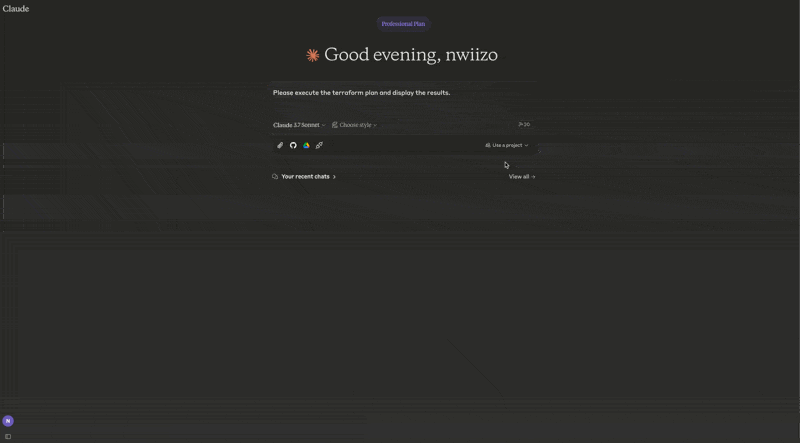Tfmcp: Terraform Modell Kontext Protokoll Werkzeug
🌍 Terraform Modell Kontextprotokoll (MCP) Tool - Ein experimentelles CLI-Tool, das KI-Assistenten ermöglicht, Terraform-Umgebungen zu verwalten und zu betreiben. Unterstützt das Lesen von Terraform-Konfigurationen, das Analysieren von Plänen, das Anwenden von Konfigurationen und das Verwalten von Zuständen mit Claude Desktop-Integration. ⚡️
Übersicht
Was ist tfmcp?
Das ### Terraform Model Context Protocol (MCP) Tool, allgemein als ### tfmcp bezeichnet, ist ein experimentelles Befehlszeilen-Interface (CLI) Tool, das entwickelt wurde, um das Management und den Betrieb von Terraform-Umgebungen zu verbessern. Es ermöglicht Benutzern, Terraform-Konfigurationen zu lesen, Pläne zu analysieren, Konfigurationen anzuwenden und den Zustand zu verwalten, während es nahtlos mit KI-Assistenten wie Claude Desktop integriert wird.
Funktionen von tfmcp
- KI-Integration: tfmcp unterstützt die Integration mit KI-Assistenten, was eine intelligentere Verwaltung von Terraform-Umgebungen ermöglicht.
- Konfigurationsmanagement: Benutzer können Terraform-Konfigurationen direkt über die CLI lesen und verwalten.
- Plananalyse: Das Tool bietet Funktionen zur Analyse von Terraform-Plänen, die den Benutzern helfen, die Auswirkungen ihrer Änderungen zu verstehen, bevor sie diese anwenden.
- Zustandsmanagement: tfmcp ermöglicht ein effizientes Management des Terraform-Zustands, sodass Benutzer ihre Infrastrukturänderungen effektiv nachverfolgen können.
- Benutzerfreundliche Oberfläche: Die CLI ist intuitiv gestaltet, was sie sowohl für neue als auch für erfahrene Benutzer zugänglich macht.
So verwenden Sie tfmcp
- Installation: Beginnen Sie mit der Installation von tfmcp von crates.io.
- Konfiguration: Richten Sie Ihre Terraform-Umgebung ein und stellen Sie sicher, dass Ihre Konfigurationen bereit zur Analyse sind.
- Befehlsausführung: Verwenden Sie die CLI-Befehle, um Konfigurationen zu lesen, Pläne zu analysieren und Änderungen anzuwenden. Zum Beispiel:
- Um eine Konfiguration zu lesen:
tfmcp read <konfigurationsdatei> - Um einen Plan zu analysieren:
tfmcp analyze <plan_datei> - Um eine Konfiguration anzuwenden:
tfmcp apply <konfigurationsdatei>
- Um eine Konfiguration zu lesen:
- Zustandsmanagement: Nutzen Sie tfmcp, um Ihren Terraform-Zustand effektiv zu verwalten und sicherzustellen, dass Ihre Infrastruktur konsistent bleibt.
Häufig gestellte Fragen
Was ist der Zweck von tfmcp?
tfmcp wurde entwickelt, um das Management von Terraform-Umgebungen zu erleichtern, indem es Werkzeuge zum Lesen von Konfigurationen, zur Plananalyse und zum Zustandsmanagement bereitstellt, während es mit KI-Assistenten integriert wird.
Ist tfmcp für Anfänger geeignet?
Ja, tfmcp ist benutzerfreundlich und so gestaltet, dass es für Benutzer aller Erfahrungsstufen zugänglich ist, einschließlich derjenigen, die neu bei Terraform sind.
Kann tfmcp mit anderen Tools integriert werden?
Ja, tfmcp ist so konzipiert, dass es neben KI-Assistenten funktioniert und in verschiedene Arbeitsabläufe integriert werden kann, um das Terraform-Management zu verbessern.
Wo finde ich weitere Informationen über tfmcp?
Für weitere Details können Sie das tfmcp-Repository auf GitHub besuchen oder die Dokumentation einsehen.
Detail
Serverkonfiguration
{
"mcpServers": {
"tfmcp": {
"command": "docker",
"args": [
"run",
"-i",
"--rm",
"ghcr.io/metorial/mcp-container--nwiizo--tfmcp--tfmcp",
"./bin/tfmcp --dir terraform-dir --path path"
],
"env": {
"TERRAFORM_DIR": "terraform-dir",
"TFMCP_LOG_LEVEL": "tfmcp-log-level",
"TFMCP_DEMO_MODE": "tfmcp-demo-mode"
}
}
}
}